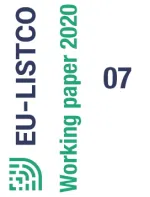Resilience and the EU’s external action instruments. Towards multiple, sustained, and indirect actions

Working paper nº 7 /2020
The EU is increasingly concerned with the diffusion and uncertainty of risks and threats in the neighbourhood, and resilience appears as a useful and pragmatic policy framework to address risks in areas of limited statehood and contested orders. The working paper draws from extensive report analysis and semi-structured interviews with EU officials to examine the diplomatic, economic, and military instruments that the EU mobilizes in a resilience-informed external action. The main contribution is that these instruments are increasingly facilitating resilience through multiple, long-term, and indirect actions. First, instruments have expanded and diversified to undertake as many different actions as possible. Second, they are sustained over long periods of time, even when there are no risks or threats or after peace and stability have been reached. Third, since resilience emerges “from below”, building on societies’ own resources and tools, EU instruments facilitate resilience indirectly, through constant engagement in the neighbourhood.
Authors:
Pol Bargués is a research fellow at the Barcelona Centre for International Affairs (CIDOB).
David Cadier is a researcher at the Centre for International Studies (CERI) at Sciences Po, Paris. He’s also an Adjunct Lecturer at Sciences Po’s School of International Affairs (PSIA) and a Research Associate at the London School of Economics (LSE).
Lidia Gibadlo is a senior researcher in the Weimar Triangle Programme at the Polish Institute of International Affairs (PISM).
Elzbieta Kaca is a senior research fellow at the Polish Institute of International Affairs (PISM).
Pol Morillas is general director and senior research fellow of the Barcelona Centre for International Affairs (CIDOB).
Luigi Narbone is director of the Middle East Directions Programme at the Robert Schuman Centre for Advanced Studies as well as coordinator of the Peace and Security cluster at the School of Transnational Governance, European University Institute (EUI).
Nicoletta Pirozzi is Head of Programme on EU, politics and institutions and Institutional Relations Manager at Istituto Affari Internazionali (IAI), Rome. She is also Associate of the European Governance and Politics Programme at the European University Institute (EUI), Florence.
Marcin Terlikowski is coordinator of the International Security programme at the Polish Institute of International Affairs (PISM).